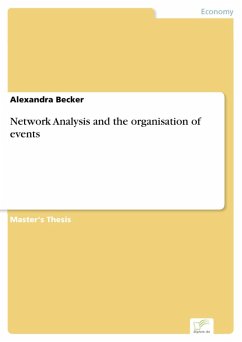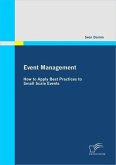Inhaltsangabe:Abstract: Within the framework of this thesis, a questionnaire-based survey was carried out among British conference organisers to find out the extent to which the use of project network techniques as a planning and monitoring tool has become widespread, which advantages or disadvantages it has when used in conference management and on which factors the use of PNT depends. In conference-related literature, little attention is paid to these techniques, their existence is only mentioned in a brief sentence, if at all. However, conference management is project management and therefore a systematic, formalised planning approach should be imperative. The survey revealed that PNT¿s are not a commonly used planning tool among conference organisers. Only one of the 63 respondents indicated that they use network analysis software. Reasons for not using network analysis include the costs, and above all the ignorance about its benefits. Popular techniques to plan and monitor events are hand-written or computer-stored tasklists. For particular requirements, such as registration, badging, invoicing etc., meeting planning software is used. However, it is not used very often for scheduling and budgeting, which are the two main areas of application of network analysis. The survey and a closer look at commercial meeting planning software reveal that network analysis features are not incorporated. Cross-tabulations between the variable ¿Use of meeting planning software¿, and demographic and company-specific factors (age, sex, position - nature of organisation, number of employees, number of events organised each year) revealed that there is a general tendency to not use meeting planning software. However, generalisations cannot be made because the number of respondents within the different response categories is generally too low to allow for valid statistical statements. Inhaltsverzeichnis:Table of Contents: Figures, Tables and Diagrams7 1.Introduction11 2.Research Methodology15 2.1Introduction15 2.2Literature Review17 2.3Research Methods21 2.3.1Qualitative Research: Action Research21 2.3.2Quantitative Research: Survey Research25 2.3.2.1Sampling27 2.3.2.2Questionnaire Design and Pre-testing30 2.3.2.3Reliability and Validity33 2.3.2.4Data Coding and Analysis34 2.3.2.5Ethical Issues35 2.4Summary36 3.Conference Management37 3.1Introduction37 3.2Project Management Process: Key Phases40 3.2.1Strategic and Operational [...]
Dieser Download kann aus rechtlichen Gründen nur mit Rechnungsadresse in A, B, BG, CY, CZ, D, DK, EW, E, FIN, F, GR, HR, H, IRL, I, LT, L, LR, M, NL, PL, P, R, S, SLO, SK ausgeliefert werden.









